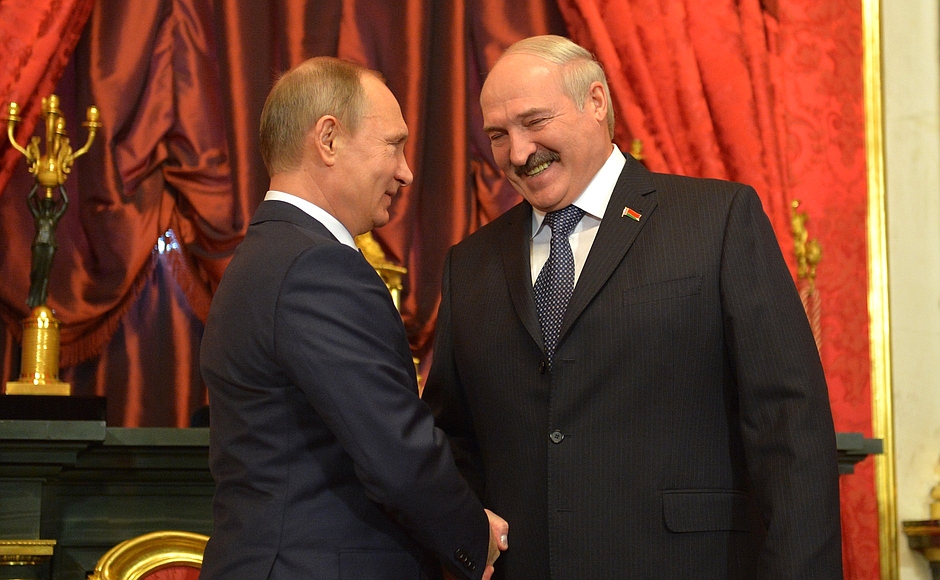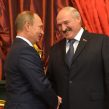
Perfect Is the Enemy of the Good: The Case of Belarus
Publication: Eurasia Daily Monitor Volume: 13 Issue: 28
By:

On February 1, Belarusian President Alyaksandr Lukashenka met with Russian leader Vladimir Putin in Sochi. The meeting was not planned in advance: Lukashenka had reportedly only called his Russian counterpart on January 28 to request this engagement. This puzzled political commentators. After all, the two heads of state met on December 15 and then on December 21 in Moscow, and were further scheduled to meet again at the end of February, in Minsk, during the session of the Supreme Council of the Union State of Russia and Belarus (Svaboda.org, February 2; Regnum, February 5).
Most experts have hypothesized that this unexpected February 1 get-together was organized to discuss aid to Belarus. In 2016, Minsk is expected to spend $3.3 billion on repaying its existing loans, including $1.8 billion as early as February. At the same time, on December 1, Belarus had only $4.176 billion in hard currency reserves (Svaboda.org, February 2). Other possible topics of discussion include the implications of Russia having canceled its free trade agreement with Ukraine when the latter’s free trade agreement with the European Union came into effect. At the same time, Belarus’s free trade agreement with Ukraine remains in force, which may become a new bargaining chip for Lukashenka, along with the proposed Russian airbase on Belarusian territory and other issues (Svaboda.org, February 2).
Frequent contacts at the highest level belie the discouraging trends of Eurasian economic integration. Notably, the first anniversary of the Eurasian Economic Union has passed by this year with nary a comment. “Knowing how diligently the current Russian government beats the drum on all TV channels over even the most insignificant occasion, anyone who sees that lacking in this case would reasonably determine that there is nothing to celebrate,” writes economist Oleg Cherkovets. Indeed, in 2015, Russia’s trade exchange with Belarus was 38.7 percent lower than in 2014 ($30.1 billion versus $21.7 billion). While shrinking trade is unavoidable during an economic crisis, the degree of decline of Russia’s trade with Belarus and with other members of the Eurasian Union exceeds the overall rate of decline (by 34 percent). Throughout the first ten months of 2015, the share of all those members (Belarus, Kazakhstan, Armenia and Kyrgyzstan) in Russia’s foreign trade amounted to just 8.2 percent. But while trade with the integration partners accounted for as much as 49.7 percent of Belarus’s overall trade, problems are looming. For example, with its more than 100 million hectares of arable land, Russia currently lacks about 100,000 tractors. The domestic capacity for producing tractors has shrunk over the 1990s and is being regained only slowly. Nevertheless, tractors are not being bought from Belarus, which has excessive tractor-producing capacity (Pravda, February 5). Also, Russia has not yet delivered on its promises to lend Belarus $2 billion.
Under this situation, putative Western donors might be best advised to loosen the purse strings. But this is not happening either. In his January 12 interview to this author (Sovrep.gov.by, January 13), the speaker of the upper chamber of the Belarusian parliament and a former prime minister (2010–2014), Mikhail Myasnikovich, lamented that the International Monetary Fund (IMF) is backtracking on its earlier willingness to resume its loan program for Belarus. According to Myasnikovich, without political will from the top, low-level operators can always find reasons not to restart the program. That would lead to autarchy and shield Belarus from the West. To make his point more suggestive, Myasnikovich invoked a short story titled “Blue Leaves” that he read as a child. In it, a girl was assigned to draw a broadleaf tree but lacked a green pencil. So she asked her classmate to lend her one, but that person set so many conditions that the girl decided against borrowing and used her own blue pencil instead. The leaves in her picture became blue as a result.
Meanwhile, pressure from some corners in the West continues to push the European Union to maintain its Belarusian sanctions in place. On October 31, 2015, the EU suspended its travel restrictions against 171 Belarusians, including Lukashenka, his two sons, the chairwoman of the Central Electoral Commission, the minister of information, the current chairman of the Belarusian KGB as well as his predecessor. Economic sanctions on ten enterprises have been suspended as well. However, the ultimate decision on these sanctions is to be taken prior to February 29, which is when the period of suspension ends. The EU’s Foreign Relations Council is scheduled to discuss the fate of the sanctions—i.e. whether to remove them altogether or to re-impose and, possibly, suspend them again—on February 15 (Tut.by, February 1). Last week (February 2–3), Zhanna Litvina, a board member and the former head of the non-governmental organization (NGO) Belarusian Association of Journalists, and Ales Belyatski, the head of the human rights watchdog Viasna, paid a visit to Brussels. There, they held talks with Helga Schmid, Deputy Secretary General for the European External Action Service (EEAS), and Stavros Lambrinidis, the EU’s Special Representative for Human Rights. The Belarusian guests argued that after the release of political prisoners in August 2015, “no other positive changes have occurred in Belarus in the area of democracy and human rights and that the presidential elections in October were replete with violations and falsifications.” In response, they received the EU’s assurance that regardless of the decision to be taken on February 15, Brussels’ attention to human rights and freedoms in Belarus would remain a priority (Tut.by, February 3).
The current debate in Europe over whether or not to maintain sanctions on Belarus illustrates the well-worn notion that “perfect is the enemy of the good.” It is true that—with or without Western sanctions—the political culture in Belarus and across much of the post-Soviet space has resisted any kind of fast transformation to reach Western standards. And yet, keeping these sanctions in place would be a gift to Belarus’s eastern neighbor as well as further consolidate and reward those inside Belarus who would like to avert any positive or pro-European domestic changes whatsoever. At the same time, the Belarusian population, which itself is gradually turning away from the EU (see EDM, January 22), might lose patience with Europe entirely.




